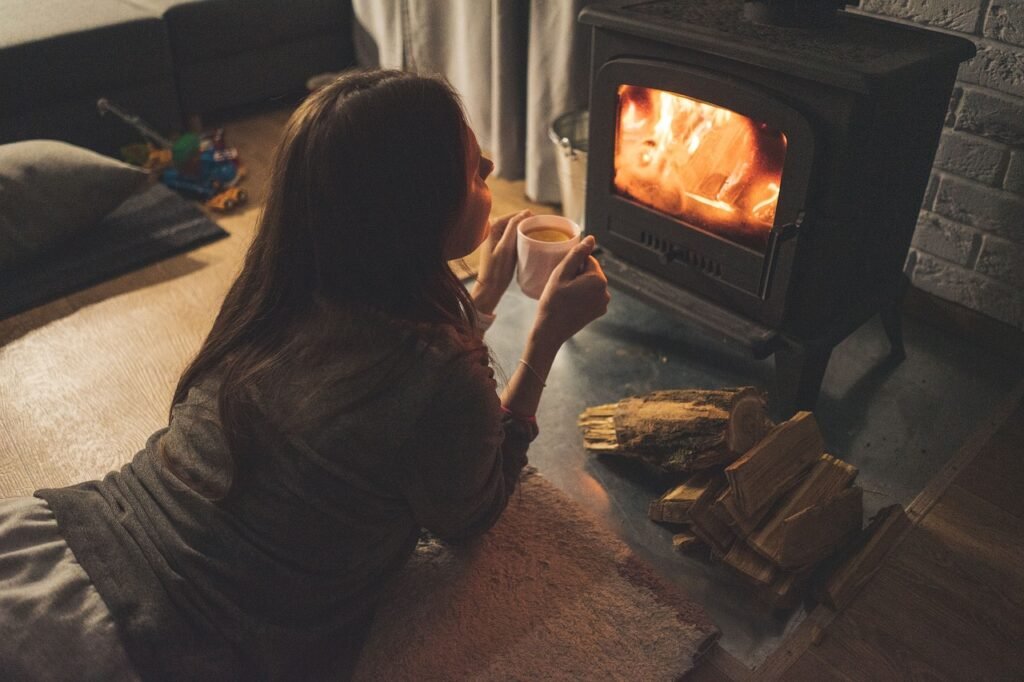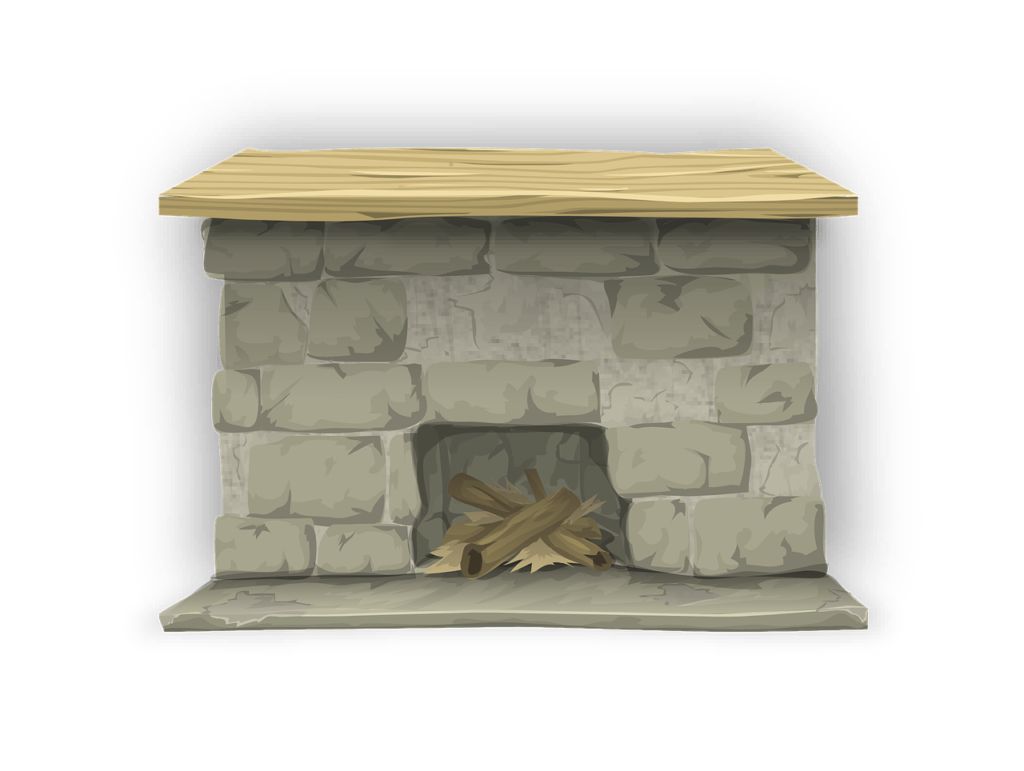Imagine curling up by a cozy fireplace on a chilly winter evening, with the flickering flames enveloping you in a warm embrace. But, have you ever wondered what size fireplace heater would be perfect for your home? It’s essential to choose the right fireplace heater capacity to ensure optimal heating and comfort. In this article, we’ll explore the importance of selecting the perfect fireplace heater size and how it can make a significant difference in keeping your home snug and inviting during those frosty months.
Calculating the Required Heating Capacity
Determining the Square Footage of the Space
When choosing a fireplace heater, one of the first factors to consider is the size of the space you wish to heat. Calculating the square footage of the room is crucial in determining the heating capacity required. To measure the square footage, simply multiply the length of the room by its width. For example, if your room measures 10 feet by 12 feet, the square footage would be 120 square feet.
Considering the Insulation Level
Another important factor to take into consideration is the insulation level of the room. Spaces that are well-insulated will require less heating capacity compared to rooms with poor insulation. Insulation helps trap the heat inside the room, preventing it from escaping. If your room is well-insulated, you may be able to choose a fireplace heater with a lower heating capacity.
Factoring in the Climate
The climate of your location also plays a significant role in determining the required heating capacity. Regions with extremely cold winters will require a fireplace heater with a higher heating capacity to ensure adequate warmth. On the other hand, if you live in a milder climate, a fireplace heater with a lower heating capacity may suffice.
Accounting for Ceiling Height
Ceiling height is another factor to consider. Higher ceilings can result in a larger volume of air that needs to be heated. If you have high ceilings, you may need to choose a fireplace heater with a higher heating capacity to effectively warm up the entire space.
Understanding Heat Output Ratings
BTU (British Thermal Unit) Measurement
Heat output ratings are an important consideration when selecting a fireplace heater. One common measurement used is British Thermal Units (BTUs). A BTU is the amount of heat required to raise the temperature of one pound of water by one degree Fahrenheit. The higher the BTU rating, the greater the heat output of the fireplace heater.
Kilowatt (kW) Rating
Kilowatt (kW) rating is another heat output measurement that is commonly used. It represents the amount of power consumed by the fireplace heater to produce heat. Similar to BTUs, a higher kW rating indicates a higher heat output.
Comparing Different Heat Output Ratings
When comparing fireplace heaters, it is important to note that the heat output ratings may differ. Some models may have higher BTU ratings but lower kW ratings, while others may have vice versa. It is essential to consider both measurements to ensure the fireplace heater you choose provides sufficient heat for your space.

This image is property of pixabay.com.
Choosing the Right Size Based on Heating Capacity
Small Room or Supplemental Heating Needs
If you are looking to heat a small room or have supplemental heating needs, a fireplace heater with lower heating capacity may be suitable. These heaters are often portable and can provide comfortable heat for spaces such as bedrooms, small living areas, or offices.
Medium-Sized Room or Moderate Heating Needs
For medium-sized rooms or moderate heating needs, a fireplace heater with a moderate heating capacity is ideal. These heaters are capable of effectively heating spaces such as living rooms, dining areas, or larger bedrooms.
Large Room or Primary Heating Needs
If you have a large room or need a primary heating source, a fireplace heater with a higher heating capacity is necessary. Larger heaters with greater heat output are designed to efficiently warm up spaces such as open-concept living areas or large family rooms.
Considering Safety and Ventilation Requirements
Determining If a Vent-Free Fireplace Heater is Suitable
When considering safety and ventilation requirements, it is crucial to determine if a vent-free fireplace heater is suitable for your space. Vent-free heaters are designed to operate without a chimney or vent system. They utilize oxygen from the room and release combustion byproducts into the air. While these heaters can be convenient and provide efficient heat, it is essential to ensure that your space has adequate ventilation to prevent a buildup of fumes and maintain air quality.
Evaluating the Need for a Chimney or Vent System
If a vent-free heater is not suitable for your space, you may need to evaluate the need for a chimney or vent system. Traditional fireplace heaters require proper ventilation to ensure the safe release of combustion byproducts. Installing a chimney or vent system may be necessary to comply with safety regulations and ensure the well-being of occupants.

This image is property of pixabay.com.
Accounting for Personal Preferences and Design Factors
Selecting the Ideal Fireplace Style and Design
In addition to heating capacity and safety considerations, personal preferences and design factors should also be taken into account when selecting a fireplace heater. There are various styles and designs available, ranging from classic brick fireplaces to modern, sleek electric models. Choosing a fireplace that complements the overall aesthetic of your space can enhance its visual appeal and create a cozy ambiance.
Considering the Space and Layout of the Room
When choosing a fireplace heater, it is essential to consider the space and layout of the room. The size, shape, and furniture placement can affect the effectiveness of the heater in distributing heat evenly throughout the space. Take into consideration whether a wall-mounted, freestanding, or corner unit would be the most practical and aesthetically pleasing option for your specific room.
Seeking Professional Advice
Consulting a Fireplace Expert
If you are unsure about which fireplace heater would best suit your needs, it is always a good idea to consult a fireplace expert. Professionals in the field have a wealth of knowledge and experience and can provide valuable insights and recommendations tailored to your specific requirements. They can help you navigate through the various options available and guide you towards choosing the perfect fireplace heater for your space.
Getting an Energy Audit
To further optimize your heating system’s efficiency, consider getting an energy audit. Energy audits assess the energy usage and efficiency of your home. They can identify areas where heat may be escaping or where insulation improvements are needed. An energy audit can help ensure that your fireplace heater operates at maximum efficiency and reduces energy waste.

This image is property of pixabay.com.
Keeping Energy Efficiency in Mind
Considering the Energy Efficiency Rating
Energy efficiency should be a factor to consider when choosing a fireplace heater. Look for models with high energy efficiency ratings. These heaters are designed to use less energy while still providing sufficient heat. Opting for an energy-efficient fireplace heater can help lower your energy bills and reduce your environmental footprint.
Selecting a Fireplace Heater with Thermostat Controls
Choosing a fireplace heater with thermostat controls can also contribute to energy efficiency. Thermostats allow you to set and maintain a desired temperature in the room. Once the desired temperature is reached, the heater will automatically adjust its heat output to maintain the set temperature. This feature prevents unnecessary energy consumption and ensures optimal comfort.
Evaluating Installation Requirements
Determining the Availability of Gas, Electricity, or Wood Supply
When considering installation requirements, it is important to determine the availability of gas, electricity, or wood supply in your home. Different types of fireplace heaters require different fuel sources. Gas fireplace heaters require a natural gas or propane supply, electric fireplace heaters require access to an electrical outlet, while wood-burning fireplace heaters need a sufficient wood supply. Ensure that your home has the necessary infrastructure to support your chosen fireplace heater.
Assessing the Installation Complexity and Cost
The installation complexity and cost of a fireplace heater should also be evaluated. Gas fireplace heaters may require professional installation to ensure proper gas line connection and venting. Electric fireplace heaters usually have simpler installation procedures, requiring only a standard electrical outlet. Wood-burning fireplace heaters may require additional considerations such as building a chimney or flue. Take into account the installation requirements and any associated costs to make an informed decision.
Considering the Long-Term Cost and Maintenance
Estimating the Operating Costs
Apart from the upfront installation expenses, it is also important to estimate the long-term operating costs of the fireplace heater. This includes the cost of fuel or electricity to run the heater. Gas and wood-burning fireplace heaters may have ongoing fuel costs, whereas electric heaters rely solely on electricity. Understanding the potential operating costs can help you budget and make a cost-effective choice.
Reviewing the Maintenance and Cleaning Needs
Different fireplace heaters have varying maintenance and cleaning requirements. Wood-burning fireplace heaters, for example, require regular chimney cleaning and ash removal. Gas and electric fireplace heaters may have simpler maintenance needs but still require periodic cleaning and inspection. Consider the maintenance and cleaning tasks associated with each type of fireplace heater and decide which option aligns with your lifestyle and preferences.
Reading Reviews and Comparisons
Researching Consumer Reviews and Ratings
Before making a final decision, it can be beneficial to research consumer reviews and ratings of different fireplace heater models. Reading about other people’s experiences with certain brands and models can provide valuable insights into performance, durability, and customer satisfaction. Take note of both positive and negative reviews to gain a balanced perspective and make an informed choice.
Comparing Different Fireplace Heater Models
Comparing different fireplace heater models is an essential step in finding the perfect option. Look for features and specifications that align with your requirements, such as heating capacity, heat output ratings, safety features, and design. Consider factors such as affordability, warranty, and brand reputation when comparing different models. By evaluating all these aspects, you can confidently select the fireplace heater that best suits your needs and preferences.
Choosing the perfect fireplace heater size requires careful consideration of various factors, including the square footage of the space, insulation level, climate, and ceiling height. Understanding heat output ratings, such as BTUs and kilowatts, helps in comparing different fireplace heater models. It is important to select the right size based on heating capacity, considering factors such as room size and heating needs. Safety and ventilation requirements should also be taken into account, whether a vent-free fireplace heater is suitable or if a chimney or vent system is necessary. Personal preferences, such as fireplace style and design, as well as the layout of the room, should be considered to ensure the fireplace heater complements the overall aesthetics. Seeking professional advice and guidance from fireplace experts, as well as getting an energy audit, can provide valuable insights in making an informed decision. Energy efficiency, installation requirements, long-term costs, and maintenance considerations should be evaluated to select a fireplace heater that is both efficient and cost-effective. Reading reviews and comparisons from other consumers can help in narrowing down the options and making the best choice for your heating needs. By considering all these factors, you can confidently choose the perfect fireplace heater for your space, providing warmth, comfort, and ambiance.




